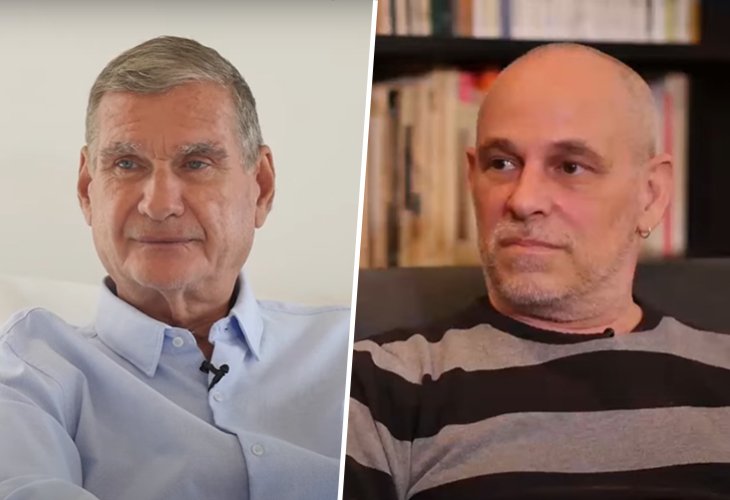Gadi Taub and Haim Ramon: "Judicial Reform is Necessary"
Gadi Taub shifted politically to the right, while Haim Ramon remained on the pragmatic left. They discuss the need for judicial reform in Israel.
 Gadi Taub and Haim Ramon
Gadi Taub and Haim RamonThe publicist Dr. Gadi Taub recently received a dismissal notice from 'Haaretz' during the height of the battle against the judicial reform. The notice claimed that the transfer of power in Israel was accompanied by an "aggressive and immediate attack on Israeli democracy, as we at 'Haaretz' perceive it," thus they are "changing the newspaper’s stance regarding your articles."
Taub's dismissal, a veteran publicist and journalist, stirred the society in Israel, though not him. "I didn’t receive compensation for publishing the articles," he says in an interview with 'Hidabroot'. "Afterward, I wrote to the public: 'Haaretz closed my section. The official reasons: 1. Democracy is defending itself and there’s no room for essays supporting the reform. 2. I am an agent of Orban. The real reason: the truth is forbidden to say,' and in my opinion, that's the sad truth."
Taub, a historian, author, Ph.D. in the history of the United States, and lecturer at the Hebrew University of Jerusalem in communication and public policy, is a valuable asset for any thriving communication system, but "as far as 'Haaretz' is concerned, I am a right-wing person who no longer belongs in the newspaper," he says.
The shift in Taub's political views occurred after Operation Pillar of Defense. "During that time, I started to connect more with the truth presented by the right. Since then, I've angered the left quite a bit, and the column that led to my termination at 'Haaretz' isn’t the only one of mine that didn’t see the light of day in the newspaper – as a policy. A column I sent in the past wasn’t published after I confronted Nahum Barnea’s claims against the right. 'Haaretz' also didn’t like that I demonstrated how rigged Netanyahu's trial is. Even the stories about the American President's son, which embarrassed the American administration, they barely allowed."
Due to Taub’s move from left to right, it is intriguing to hear his opinion on what has been happening since the formation of the current government. "Many media outlets in the country have become part of the opposition’s messaging sheet, and are fully participating in a campaign seen everywhere – aiming to prevent the judicial reform that will return power to the people from its usurpers," he clarifies.
"Children's Arguments"
How much of a threat does the new right-wing government pose to the left?
"Since the last government was formed, the left feels it is in a kind of war for the home. It’s the decisive battle over the end of leftist rule in this country, which remained eternal over the last three decades despite changes in government. Haaretz's attitude towards me is one sign of that. Ironically, my dismissal was a strategic mistake on their part," he says. "The dismissal led to the censored article being read much more than if it had been published in the newspaper. At those moments, I was happy they admitted they can't tolerate my views, highlighting they have no countering argument."
And what about the judicial reform?
"The reform must pass. It is not an attack on democracy as claimed by parts of the left. The left, opposing the reform, defends a form of governance unique to Israel, wherein real sovereignty is held by 17 judges who deceitfully took it from the people. And even if we assume that in Israel there’s no constitution, since when does lack of a constitution mean judges should rule?
"And no, there will not be a Knesset decision to expel all leftists," Taub clarifies in response to warnings issued by reform opponents about what might happen afterward. "They also know there is no parliament in the world that made such an extreme decision. Amusingly, the parliament never contemplated canceling elections, but the court suggested it might in context with Netanyahu’s trial. Thus, I always say their arguments sound more and more like a messaging sheet for kids."
Generally, Taub goes further, arguing, "Yariv Levin's reform is far from perfect, with too many gaps allowing elites to disrupt voters' will. The attorney’s office acts as the praetorian guard of the Supreme Court and has undergone extreme politicization, successfully dismantling the only body supposed to oversee it, and predictably failing utterly in eliminating corruption within (cases of Ruth David, the Perinya brothers, Abu Al-Kiyan case, concealment of wiretaps in Ramon’s case, construction authority case, and more); a quarter-century of radical rulings will pass before changes in the selection committee for judges bring slight diversity in the activist 'creative' lineup of the Supreme Court. The post-modern interpretation doctrine led by Aharon Barak won't swiftly allow restoring legal certainty to the halls of justice."
Pragmatic Left
Alongside Taub, several prominent figures on the left, past and present, understand the scare campaign occurring lately has crossed all lines, preventing many on the left from seeing reality clearly. One of the prominent ones is Haim Ramon, a former politician considered a dominant force in the left during his time. From his standpoint as a former member of the 'Labor' party, he believes the left continues its campaign against the reform based on distortions and a desire for power despite the majority being on the opposing side. "It’s a campaign by people fighting to preserve their power," he tells 'Hidabroot'. "I claim most fighting the reform are people without understanding of the legal matter."
Ramon is well acquainted with the judicial system. Upon the formation of the 31st government of Israel under Ehud Olmert, he was appointed Minister of Justice. Immediately upon entering his role, he began implementing extensive legal reforms – such as the Basic Law on Legislation, the legal system’s Code of Ethics, and amendments to the Citizenship Law. He also worked on accelerating complete separation of the Internal Investigations Department from the police, to prevent any connection between the police investigation departments and the department investigating the police themselves.
 Ramon (Photo: Yossi Aloni / Flash 90)
Ramon (Photo: Yossi Aloni / Flash 90)Ramon then led moves similar to Levin's. Today he is one of the few voices on the left agreeing to refute reform opponents’ claims. In conversation, he explains, "Economists listen to lawyers, particularly former Chief Justice Aharon Barak; they claim there will be a dictatorship, and economists respond that if that’s the case – the Israeli economy will suffer. The problem is there won’t be a dictatorship. That’s precisely what the debate revolves around, and economists don’t understand this."
Ramon gives an example from the opposing side of the political map. "When Prof. Aumann stated his support for most of the reform plan, former Justice Minister Gideon Sa'ar responded by saying Aumann received a Nobel for Economics, not Law. It’s the same here: these economists understand economics, not law." As it turns out, Ramon knows what he's talking about: "I meet with these people," he shares, "and I find they have no information about the reform."
Regarding claims warning of the reform’s harm to the economy, Ramon believes they are baseless. "The Israeli economy is in excellent condition," he argues. "To say we are on the brink of collapse – is far from the truth. I know Israeli economists who traveled to Saudi Arabia and returned dazzled with excitement, emphasizing the need for economic cooperation with the Arab state. Saudi Arabia, as known, is among the most liberal democracies globally," he says sarcastically. "The same goes for the Emirates. The connection between the legal and economic systems, it turns out, is not obvious."
In your opinion, what in the system needs changing?
"Many things," he answers. "Barak came about three decades ago, after very prominent jurists were already here who did nothing against the elected system, and still, there wasn’t chaos and darkness, but rather very respectful relations between the authorities. He decided to instigate a revolution, without authority and without mandate. Why? Because he wanted to be the supreme ruler. As Supreme Court Justice Landau said to him, 'We were not elected to govern but to judge.' Barak didn’t listen.
"Today, it has reached a point where even basic laws are being annulled. Even the Nation-State Law is being debated, although it is a basic law, and no one can say otherwise. Overall, the current situation is intolerable," he continues, "the Supreme Court can decide to invalidate a decision supported by all 120 Knesset members. Sadly, some prefer living in a judicial dictatorship after giving up hope of winning elections."
At this stage, Ramon directs us to a remarkable fact overlooked by the public: "It’s important to understand when it’s said today that the composition of the court shouldn’t change, few know that during the Bennett-Lapid government, led by Minister Kahana, they increased the government’s power in the committee for appointing dayanim, with a minister and someone else decided by the government, creating a majority for the government. They were allowed, and no one spoke of 'the end of democracy.' Now the government has changed, and it has the right to promote similar changes."

